███████ ██████
-
Blog, GitHub (Gists), GitLab (Snippets)
-
soundcloud, youtube music, music playlists, spotify, twitch, steam
sockdreams wishlist, amazon wishlist, sponsor me
-
I make real things without the use of generative networks. If you would like to commission me for code, software, penetration testing, security consultation, graphics design, web design, video editing, funny photoshop edits, cosplay requests; feel free to contact me here.
Don't need a commission but like what I do? You can support me with a gift or a donation!
Things that I've done:
Automator Workflows for macOS
Display Checksum
Displays a MD5 and SHA-256 checksum for the selected file.
Available in "Quick Actions > Display Checksum" for all files.
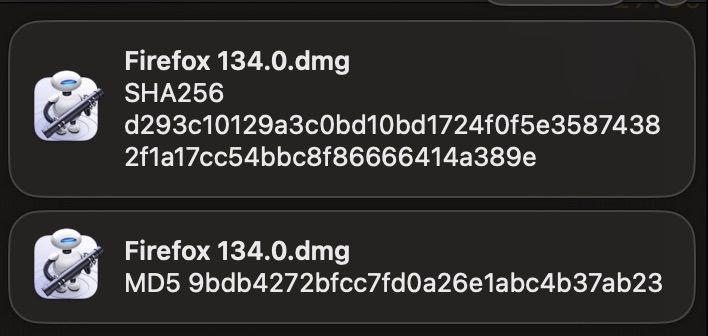
Download
Auto Filename
Renames the selected file to <Current Unix Timestamp> + <3 Random Digits>, e.g. Firefox 134.0.dmg -> 1737140461424.dmg.
Available in "Quick Actions > Auto Filename" for all files.

Download
Cryptocurrency payment processor
A cryptocurrency donation & payment system.
Features:
- Works regardless of whether the user has JavaScript enabled.
- Generates a QR code for the payment address. (A new payment address is generated for each transaction.)
- Automatic currency conversion.
- Supports payment via a multitude of coins.

walletfind
Cryptocurrency Wallet Finder - Currently supports finding numerous wallet types, such as monero, bitcoin, ethereum, doge, blockchain, metamask, electrum. It will also look for possible mnemonic phrases saved in files.
import os, re, sys, subprocess
from datetime import datetime
start=datetime.now()
if len(sys.argv) < 2:
sys.exit("File path not specified. Exiting...")
path = sys.argv[1]
files_list = []
popen = subprocess.Popen(["find", path], stdout=subprocess.PIPE)
resultOfSubProcess, errorsOfSubProcess = popen.communicate()
files_list = resultOfSubProcess.decode().splitlines()
ignore_filetypes = [".png", ".png", ".png", ".bmp", ".gif", ".svg", ".mp3", ".m4a", ".wav", ".ogg", ".mp4", ".webm", ".mov", ".exe", ".dll", ".dmg", ".zip", ".tar", ".gz", ".tgz", ".rar", ".7z", ".html", ".css", ".php", ".js", ".map", ".less", ".py", ".pyc", ".yml", ".tmpl", ".sql", ".conf", ".sh"]
ignore_filenames = ["robots.txt", "thumbs.db", ".DS_Store", "node_modules", "__pycache__", "site-packages", ".npmignore", ".git"]
mnemonic_lenghts = [9, 13, 16, 18, 21, 22, 24, 25]
wallet_files = ["wallet.dat", "aes.json", "userkey.json", "dumpwallet.txt", "wallet-backup", "wallet-backup", "wallet.db", "change.json", "request.json", "legacy.json", "dump.txt", "privkeys.txt", "wallet-data.json", "main_dump.txt", "secondpass_dump.txt", "wallet.android", "wallet.desktop", "wallet-android-backup", "electrum", "identity.json", "wallet.aes", "metamask", "wallet.vault", "bitcoin", "bitcoinj", ".encrypted", "myetherwallet", "mnemonic", ".keys", "kdfparams"]
wallet_strings = ["keymeta!", ".multibit.", "bitcoin", "hd_account", "hdm_address", "pbkdf2_iterations", "bitcoin.main", "addr_history", "master_public_key", "wallet_type", "{\"data\":", "pendingNativeCurrency", "Block_hashes", "mintpool", "mainnet", "testnet", "ethereum", "Ethereum", "mnemonic", "kdfparams", "additional_seeds", "always_keep_local_backup", "BIP39", "BIP-39", "blockchain", "metamask", "electrum"]
for current_file in files_list:
if os.path.splitext(current_file)[1] not in ignore_filetypes and os.path.basename(current_file) not in ignore_filenames:
for wallet in wallet_files:
if wallet in current_file:
print("[POSSIBLE WALLET] [FILE] " + current_file)
is_file = os.path.isfile(current_file)
if is_file:
num_words = 0
try:
current_file_binary = open(current_file, 'rb')
current_file_binary_data = current_file_binary.read()
except:
pass
try:
words = current_file_binary_data.split()
num_words += len(words)
if num_words in mnemonic_lenghts:
print("[POSSIBLE MNEMONIC] " + str(num_words) + " WORDS found in " + current_file)
except:
pass
try:
for wallet_data in wallet_strings:
if re.search(wallet_data, str(current_file_binary_data), re.IGNORECASE):
print("[POSSIBLE WALLET] [DATA] \"" + wallet_data + "\" found in " + current_file)
except:
pass
try:
current_file_binary.close()
except:
pass
print("\nCompleted in " + str(datetime.now()-start))
A script which parses Logseq journals into blog posts.
Features:
- uses invidio.us for youtube embeds (likely broken due to recent youtube changes)
- emoji to twemoji conversion (license: static/twemoji/LICENSE)
- highlightjs code syntax highlighting (license: static/highlightjs/LICENSE)
- thumbnail ceation and embeds (note, thumbnails are very compressed):
- external site embeds: youtube, soundcloud
- .mp4, .webm and .mov thumbnails + embeds
- .jpg, .jpeg, .jpe, .gif, .png and .bmp thumbnails + embeds
- supports darkmode browser extensions
- post file size displayed
- displaying of post creation and edit time
- user profile display

A javascript based shell config generator.
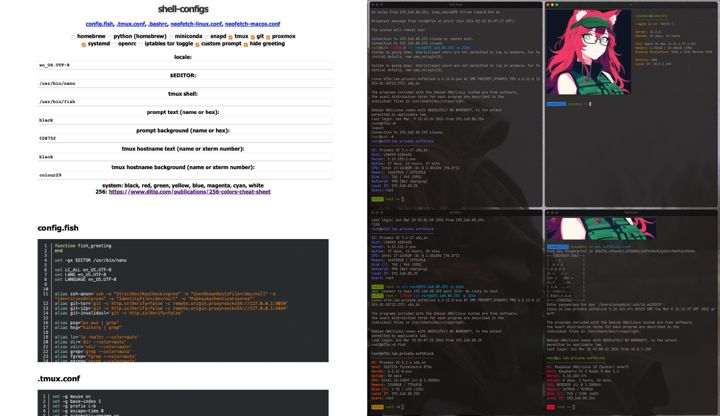
xPoster
Front-end for the do_social_media_post.py crossposter.

do_social_media_post
Social media crossposter.
import json, shlex, sys
from subprocess import Popen
caption = sys.argv[1]
image_caption = ""
if len(sys.argv) == 4:
image_caption = sys.argv[3]
social_media = sys.argv[2].split(',')
is_image = False
if caption.endswith(('jpg', 'png', 'gif', 'jpeg')):
is_image = True
for site in social_media:
if is_image == False:
if site != "instagram":
command = "/opt/homebrew/opt/python@3.9/libexec/bin/python3 /Users/admin/Documents/social_media_bots/"+site+"/posters/"+site+"_text.py " + json.dumps(caption)
print(command)
proc = Popen(shlex.split(command))
proc.communicate()
else:
print("instagram does not support text posting")
else:
command = "/opt/homebrew/opt/python@3.9/libexec/bin/python3 /Users/admin/Documents/social_media_bots/"+site+"/posters/"+site+"_image.py " + json.dumps(caption) + " " + json.dumps(image_caption)
print(command)
proc = Popen(shlex.split(command))
proc.communicate()
macOS 14.4 configuration
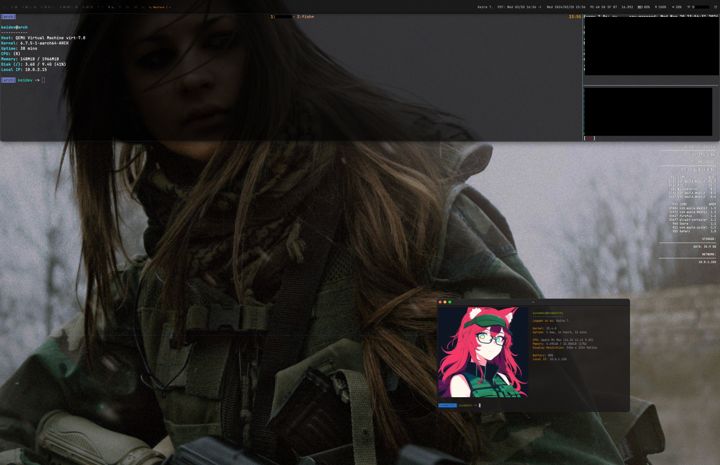
proxmox-backup
A script to backup Proxmox containers and host configs with the optional ability to automatically store them in LUKS-encrypted images. Also available for LXD.
#!/bin/bash -l
backups_folder="/Backups/Pi/$hostname"
path="/tmp/backup-$hostname/"
path_host=$path"host/"
path_containers="/var/lib/vz/dump"
mail=1
mailto="root"
make_encrypted=0
encryption_passphrase="passphrase"
path_crypt="luks/"
crypt_ext=".crypt"
days=7
run=$1
wait=120
timestamp=$(date +%Y%m%d_%H%M%S)
host_files=("/root/.bashrc" "/root/.ssh" "/root/.bash_profile" "/root/.bash_history" "/root/.tmux.conf" "/root/.local/share/fish" "/root/Scripts" "/etc/wireguard" "/etc/logrotate.d" "/etc/profile" "/etc/netdata" "/etc/fish" "/etc/fail2ban" "/etc/ssh" "/etc/sysctl.conf" "/etc/cron.d" "/etc/cron.daily" "/etc/cron.weekly" "/etc/cron.hourly" "/etc/cron.deny" "/etc/crontab" "/var/spool/cron" "/etc/sysconfig" "/etc/fstab" "/etc/crypttab" "/etc/postfix" "/etc/hosts" "/etc/resolv.conf" "/etc/aliases" "/etc/rsyslog.d" "/etc/ufw" "/etc/pam.d" "/etc/netplan" "/etc/wpa_supplicant" "/etc/network" "/etc/networks" "/etc/apt" "/etc/apticron" "/etc/yum.repos.d" "/etc/iptables.rules" "/etc/ip6tables.rules" "/etc/iptables" "/etc/modprobe.d" "/etc/pve" "/etc/udev" "/etc/modules-load.d" "/etc/systemd" "/etc/update-motd.d" "/etc/lightdm" "/etc/groups" "/etc/passwd" "/etc/nsswitch.conf" "/etc/netatalk" "/etc/samba" "/etc/avahi" "/etc/default" "/etc/nanorc" "/etc/X11" "/etc/netconfig")
core=("100" "101" "102" "103")
log_file=backup-$hostname-$timestamp.log
log=$path$log_file
rm -r $path
rm -r $path_containers
mkdir -p $path
mkdir -p $path_host
mkdir -p $path_containers
mkdir -p $backups_folder
if [[ "$make_encrypted" == 0 ]]; then
mkdir -p $path$path_crypt
fi
convertsecs() {
((h=${1}/3600))
((m=(${1}%3600)/60))
((s=${1}%60))
printf "%02d:%02d:%02d\n" $h $m $s
}
proxmox_backup() {
container=$1
vzdump $container
pct unlock $container
}
make_encrypted_container(){
name=$1
file=$2
mountpoint="$2/enc/"
size=$(du -s $file | awk '{print $1}')
if [ "$size" -lt "65536" ]; then
size=65536
else
size="$(($size + 65536))"
fi
crypt_filename=$hostname-$name-$timestamp$crypt_ext
crypt_mapper=$hostname-$name-$timestamp
crypt_devmapper="/dev/mapper/$crypt_mapper"
fallocate -l "$size"KB $path$path_crypt$crypt_filename
printf $encryption_passphrase | cryptsetup luksFormat $path$path_crypt$crypt_filename -
printf $encryption_passphrase | cryptsetup luksOpen $path$path_crypt$crypt_filename $crypt_mapper
mkfs -t ext4 $crypt_devmapper
mkdir -p $mountpoint
mount $crypt_devmapper $mountpoint
}
unmount_encrypted_container(){
name=$1
mountpoint="$2/enc/"
crypt_mapper=$hostname-$name-$timestamp
crypt_devmapper="/dev/mapper/$crypt_mapper"
umount $mountpoint
cryptsetup luksClose $crypt_mapper
}
if [[ "$run" == 1 ]]; then
if [[ "$make_encrypted" == 1 ]]; then
find $backups_folder -maxdepth 1 -name "*$crypt_ext" -type f -mtime +$days -print -delete >> $log
fi
find $backups_folder -maxdepth 1 -name "*.log" -type f -mtime +$days -print -delete >> $log
find $backups_folder -maxdepth 1 -name "*.tar" -type f -mtime +$days -print -delete >> $log
find $backups_folder -maxdepth 1 -name "*.zip" -type f -mtime +$days -print -delete >> $log
fi
START_TIME=$(date +%s)
echo "Backup:: Script start -- $timestamp" >> $log
echo "Backup:: Host: $hostname -- Date: $timestamp" >> $log
echo "Paths:: Host: $path" >> $log
echo "Paths:: Containers: $path_containers" >> $log
echo "Paths:: Backups: $backups_folder" >> $log
echo "Backup:: Backing up the following host files to $path_host" >> $log
for host_file in ${host_files[@]}; do
echo "Backup:: Starting backup of $host_file to $path_host" >> $log
host_file_safe=$(echo $host_file | sed 's|/|-|g')
if [[ "$run" == 1 ]]; then
zip -r $path_host$host_file_safe-$timestamp.zip "$host_file" >> $log
fi
done
echo "Backup:: Host files successfully backed up" >> $log
if [[ "$run" == 1 ]]; then
if [[ "$make_encrypted" == 1 ]]; then
echo "Backup:: Making an encrypted container for host files" >> $log
make_encrypted_container "host" $path_host
echo "Backup:: Moving files to encrypted container" >> $log
mv $path_host/*.zip "$path_host/enc/"
echo "Backup:: Unmounting encrypted container" >> $log
unmount_encrypted_container "host" $path_host
rm -rf $path_host/*
echo "Backup:: Successfully encrypted host backup" >> $log
fi
fi
echo "Backup:: Backing up containers" >> $log
for container in ${core[@]}; do
echo "Backup:: Starting backup on $container to $path_containers" >> $log
if [[ "$run" == 1 ]]; then
proxmox_backup $container >> $log
sleep $wait
fi
done
if [[ "$run" == 1 ]]; then
if [[ "$make_encrypted" == 1 ]]; then
echo "Backup:: Making an encrypted container for containers" >> $log
make_encrypted_container "containers" $path_containers
echo "Backup:: Moving files to encrypted container" >> $log
mv $path_containers/*.tar.gz "$path_containers/enc/"
echo "Backup:: Unmounting encrypted container" >> $log
unmount_encrypted_container "core" $path_containers
rm -rf $path_containers/*
echo "Backup:: Successfully encrypted core container backup" >> $log
fi
sleep $wait
fi
rsync -a --progress $log $backups_folder >> $log
if [[ "$make_encrypted" == 1 ]]; then
rsync -a --progress $path$path_crypt $backups_folder >> $log
else
rsync -a --progress $path_host $backups_folder >> $log
rsync -a --progress $path_containers/ $backups_folder >> $log
fi
END_TIME=$(date +%s)
elapsed_time=$(( $END_TIME - $START_TIME ))
echo "Backup :: Script End -- $(date +%Y%m%d_%H%M)" >> $log
echo "Elapsed Time :: $(convertsecs $elapsed_time) " >> $log
backup_size=`find $path -maxdepth 5 -type f -mmin -360 -exec du -ch {} + | grep total$ | awk '{print $1}'`
backup_stored=`find $path -maxdepth 5 -type f -exec du -ch {} + | grep total$ | awk '{print $1}'`
disk_remaining=`df -Ph $backups_folder | tail -1 | awk '{print $4}'`
echo -e "Subject: [$hostname] Backup Finished [$backup_size] [stored: $backup_stored | disk remaining: $disk_remaining] (took $(convertsecs $elapsed_time))\n\n$(cat $log)" > $log
if [[ "$mail" == 1 ]]; then
sendmail -v $mailto < $log
fi
sleep $wait
rm -r $path
rm -r $path_containers
lxd-backup
#!/bin/bash
hostname=$(hostname)
lxc="/snap/bin/lxc"
path="/mount/backups/$hostname/"
path_host=$path"host/"
path_lxd=$path"lxd/"
path_lxd_core=$path"lxd/core/"
mail=1
mailto="root"
make_encrypted=1
encryption_passphrase="passphrase"
path_crypt="luks/"
crypt_ext=".encrypted"
days=7
run=1
wait=15
timestamp=$(date +%Y%m%d_%H%M%S)
/bin/mkdir -p $path
/bin/mkdir -p $path_host
/bin/mkdir -p $path_lxd
/bin/mkdir -p $path_lxd_core
if [[ "$make_encrypted" == 1 ]]; then
/bin/mkdir -p $path$path_crypt
fi
convertsecs() {
((h=${1}/3600))
((m=(${1}%3600)/60))
((s=${1}%60))
/usr/bin/printf "%02d:%02d:%02d\n" $h $m $s
}
lxdbackup() {
container=$1
folder=$2
snapshotname=$container-$timestamp.snapshot
backupname=lxd-image-$container-$timestamp
$lxc snapshot $container $snapshotname
$lxc publish --force $container/$snapshotname --alias $backupname
$lxc image export $backupname $folder$backupname
$lxc delete $container/$snapshotname
$lxc image delete $backupname
}
make_encrypted_container(){
name=$1
file=$2
mountpoint="$2/enc/"
size=$(du -s $file | awk '{print $1}')
if [ "$size" -lt "65536" ]; then
size=65536
else
size="$(($size + 65536))"
fi
crypt_filename=$hostname-$name-$timestamp$crypt_ext
crypt_mapper=$hostname-$name-$timestamp
crypt_devmapper="/dev/mapper/$crypt_mapper"
/usr/bin/fallocate -l "$size"KB $path$path_crypt$crypt_filename
/usr/bin/printf $encryption_passphrase | /sbin/cryptsetup luksFormat $path$path_crypt$crypt_filename -
/usr/bin/printf $encryption_passphrase | /sbin/cryptsetup luksOpen $path$path_crypt$crypt_filename $crypt_mapper
/sbin/mkfs -t ext4 $crypt_devmapper
/bin/mkdir -p $mountpoint
/bin/mount $crypt_devmapper $mountpoint
}
unmount_encrypted_container(){
name=$1
mountpoint="$2/enc/"
crypt_mapper=$hostname-$name-$timestamp
crypt_devmapper="/dev/mapper/$crypt_mapper"
/bin/umount $mountpoint
/sbin/cryptsetup luksClose $crypt_mapper
}
host_files=("/root/.bashrc" "/root/.bash_profile" "/root/.bash_history" "/root/.tmux.conf" "/root/.local/share/fish" "/root/scripts" "/etc/wireguard" "/etc/logrotate.d" "/etc/profile" "/etc/netdata" "/etc/fish" "/etc/fail2ban" "/etc/ssh" "/etc/sysctl.conf" "/etc/cron.d" "/etc/cron.daily" "/etc/cron.weekly" "/etc/cron.hourly" "/etc/cron.deny" "/etc/crontab" "/var/spool/cron" "/etc/sysconfig" "/etc/fstab" "/etc/crypttab" "/etc/postfix" "/etc/hosts" "/etc/resolv.conf" "/etc/aliases" "/etc/rsyslog.d" "/etc/ufw" "/etc/pam.d" "/etc/netplan" "/etc/wpa_supplicant" "/etc/network" "/etc/networks" "/etc/apt" "/etc/apticron" "/etc/yum.repos.d")
core=("nginx mariadb mail")
logname=backup-$hostname-$timestamp.log
log=$path$logname
if [[ "$make_encrypted" == 1 ]]; then
find $path$path_crypt -maxdepth 1 -name "*$crypt_ext" -type f -mtime +$days -print -delete >> $log
fi
find $path_host -maxdepth 1 -name "*.zip" -type f -mtime +$days -print -delete >> $log
find $path_host -maxdepth 1 -name "*.log" -type f -mtime +$days -print -delete >> $log
find $path_lxd_core -maxdepth 1 -name "*.tar.gz" -type f -mtime +$days -print -delete >> $log
START_TIME=$(date +%s)
echo "Backup:: Script start -- $timestamp" >> $log
echo "Backup:: Host: $hostname -- Date: $timestamp" >> $log
echo "Backup:: Backing up the following host files to $path_host" >> $log
echo $host_files >> $log
for host_file in ${host_files[@]}; do
echo "Backup:: Starting backup of $host_file to $path_host" >> $log
host_file_safe=$(echo $host_file | sed 's|/|-|g')
if [[ "$run" == 1 ]]; then
zip -r $path_host$host_file_safe-$timestamp.zip "$host_file" >> $log
fi
done
echo "Backup:: Host files successfully backed up" >> $log
if [[ "$run" == 1 ]]; then
if [[ "$make_encrypted" == 1 ]]; then
echo "Backup:: Making an encrypted container for host files" >> $log
make_encrypted_container "host" $path_host
echo "Backup:: Moving files to encrypted container" >> $log
/bin/mv $path_host/*.zip "$path_host/enc/"
echo "Backup:: Unmounting encrypted container" >> $log
unmount_encrypted_container "host" $path_host
/bin/rm -rf $path_host
echo "Backup:: Successfully encrypted host backup" >> $log
fi
fi
echo "Backup:: Backing up containers" >> $log
for container in ${core[@]}; do
echo "Backup:: Starting backup on $container to $path_lxd_core" >> $log
if [[ "$run" == 1 ]]; then
lxdbackup $container $path_lxd_core $ >> $log
/bin/sleep $wait
fi
done
if [[ "$run" == 1 ]]; then
if [[ "$make_encrypted" == 1 ]]; then
echo "Backup:: Making an encrypted container for core containers" >> $log
make_encrypted_container "core" $path_lxd_core
echo "Backup:: Moving files to encrypted container" >> $log
/bin/mv $path_lxd_core/*.tar.gz "$path_lxd_core/enc/"
echo "Backup:: Unmounting encrypted container" >> $log
unmount_encrypted_container "core" $path_lxd_core
/bin/rm -rf $path_lxd_core
echo "Backup:: Successfully encrypted core container backup" >> $log
fi
/bin/sleep $wait
fi
END_TIME=$(date +%s)
elapsed_time=$(( $END_TIME - $START_TIME ))
echo "Backup :: Script End -- $(date +%Y%m%d_%H%M)" >> $log
echo "Elapsed Time :: $(convertsecs $elapsed_time) " >> $log
backup_size=`find $path -maxdepth 5 -type f -mmin -360 -exec du -ch {} + | grep total$ | awk '{print $1}'`
backup_stored=`find $path -maxdepth 5 -type f -exec du -ch {} + | grep total$ | awk '{print $1}'`
disk_remaining=`df -Ph $path | tail -1 | awk '{print $4}'`
echo -e "Subject: [$hostname] Backup Finished [$backup_size] [stored: $backup_stored | disk remaining: $disk_remaining] (took $(convertsecs $elapsed_time))\n\n$(cat $log)" > $log
if [[ "$mail" == 1 ]]; then
/usr/sbin/sendmail -v $mailto < $log
fi
githubrepos
Periodically make a HTML page of your GitHub repos (requires GitHub cli tools (gh command)).
import json, humanize, os, html
from datetime import datetime, timedelta
file = '/home/admin/Repositories/Public/github.html'
github_json_file = '/home/admin/Resources/github.json'
def human_size(filesize):
return humanize.naturalsize(filesize)
def recent_date(unixtime):
dt = datetime.fromtimestamp(unixtime)
today = datetime.now()
today_start = datetime(today.year, today.month, today.day)
yesterday_start = datetime.now() - timedelta(days=1)
def day_in_this_week(date):
startday = datetime.now() - timedelta(days=today.weekday())
if(date >= startday):
return True
else:
return False
timeformat = '%b %d, %Y'
if day_in_this_week(dt):
timeformat = '%A at %H:%M'
if(dt >= yesterday_start):
timeformat = 'Yesterday at %H:%M'
if(dt >= today_start):
timeformat = 'Today at %H:%M'
return(dt.strftime(timeformat))
def shorten_text(s, n):
if len(s) <= n:
return s
n_2 = int(n) / 2 - 3
n_1 = n - n_2 - 3
return '{0}...{1}'.format(s[:int(n_1)], s[-int(n_2):])
cmd = 'gh repo list researcx -L 400 --visibility public --json name,owner,pushedAt,isFork,diskUsage,description > github.json'
repo_list = ""
last_updated = ""
i = 0
with open(github_json_file, 'r') as gh_repos:
repos = json.load(gh_repos)
for repo in repos:
i = 1 if i == 0 else 0
iso_date = datetime.strptime(repo['pushedAt'], '%Y-%m-%dT%H:%M:%SZ')
timestamp = int((iso_date - datetime(1970, 1, 1)).total_seconds())
date_time = recent_date(timestamp)
str_repo = str(repo['name'])
path_repo = str(repo['owner']['login']) + "/" + html.escape(str(repo['name']))
str_desc = "<br/><span class='description' title='" + html.escape(str(repo['description'])) + "'>" + shorten_text(html.escape(str(repo['description'])), 150) + "</span>"
link_repo = '<a href="https://github.com/'+path_repo+'" class="user" target="_blank">'+str(repo['owner']['login']) + "/"+'</a><a href="https://github.com/'+path_repo+'" target="_blank">'+str_repo+'</a>'
disk_usage = " " + human_size(repo['diskUsage'] * 1024) + " "
is_fork = "<span title='Fork'>[F]</span> " if repo['isFork'] == True else ""
repo_list += """
<div class="list v"""+str(i)+""""><span style="float:right;">""" + is_fork + disk_usage + str(date_time) + """</span>""" + link_repo + str_desc + """</div>"""
if last_updated == "":
last_updated = timestamp
html = """
<!DOCTYPE html>
<html lang="en">
<head>
<meta charset="UTF-8">
<meta name="viewport" content="width=device-width, initial-scale=1.0">
<meta http-equiv="X-UA-Compatible" content="ie=edge">
<title>repositories</title>
<style>
body, html {
padding: 0px;
margin: 0px;
color: #dc7224;
font-family: JetBrainsMono, Consolas, "Helvetica Neue", Helvetica, Arial, sans-serif
}
a {
color: #dc7224 !important;
text-decoration: none;
}
a:hover {
color: #efefef !important;
tect-decoration: underline;
}
a.user {
color: #aa7735 !important;
text-decoration: none;
}
span {
font-size: 14pt;
margin-top: 2px;
color: #555;
}
.list {
font-size: 16pt;
padding: 4px 8px;
border-bottom: 1px dashed #101010;
background: #000;
}
.list.v0 {
background: #0f0f0f;
}
.list.v1 {
background: #121212;
}
.description{
font-size: 10pt;
color: #555;
}
</style>
</head>
<body>"""+repo_list+"""
<div class="list" style="text-align: right;">
<span style="text-style: italic; font-size: 9pt;">generated by <a href="https://researcx.gitlab.io/#d97c874b">githubrepos.py</a></span>
</div>
</body>
</html>
"""
f = open(file, "w+")
f.write(html)
f.close()
os.utime(file, (last_updated, last_updated))
researcx/ss13-lawgen [Content-Warning]
Space Station 13 AI Law Generator (Browser Version).
researcx/spacetopia (Spacetopia)
A role-play oriented Space Station 13 mod which adds certain Second-Life features and character customisation amongst other changes that are highly inspired by EVE Online and Furcadia.
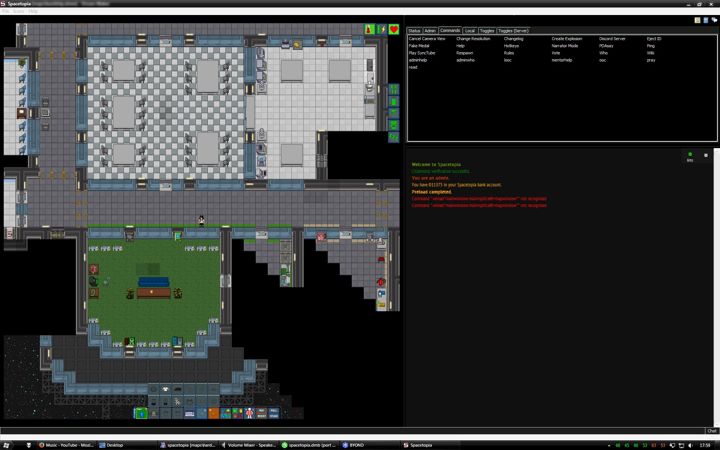
Features:
- A marketplace where users can submit various types of clothing, character details and miscellaneous other vanity items.
- Users can buy things from the marketplace to apply to their character, items can also be gifted to other users.
- Extensive character customization with the ability to change your skin tone and color, the detail and color of body parts and the ability to change the style of your body.
- All outfits/uniforms are separated into tops, bottoms, underwear and socks (with inventory slots for each) for better customization.
- Clothing selection using clothes from the marketplace is available on the character preference screen.
- Customizable personal housing with item/storage persistency and the ability to change your furniture/decor.
- Station doesn't require large amounts of maintenance thus making it perfect for semi-serious and serious roleplay.
- In-game integration with on-site Spacetopia currency.
- New game and web UI.
- Ability to set up extra information/a character sheet.
- Ability to change resolution/view distance
- Character preview can be rotated by clicking on it.
- Players can decide whether to spawn with a satchel or a backpack.
- Improved sprites for floors, air alarms, APC's and ATMs.
- More nature sprites.
- Gender is now a text field.
- Closets spawn with parts of clothing rather than uniforms.
- PvP toggle and PvP-only areas (such as exploratory).
- No permadeath.
- Players spawn as a civilian by default and can choose an occupation later in-game using a computer.
- Many sprites, optimizations, fixes and features ported from D2Station.
- Major improvements upon the API system written for D2Station V4.
More images...
weatherscript
Adjust cpu frequency based on time and weather. (For solar panels.)
LAT=53.3963308
LON=-1.5155923
JSON=$(curl -s "https://api.open-meteo.com/v1/forecast?latitude=$LAT&longitude=$LON¤t_weather=true")
WEATHERCODE=$(echo $JSON | jq -r '.current_weather.weathercode')
IS_DAY=$(echo $JSON | jq -r '.current_weather.is_day')
if [ "$IS_DAY" -eq 1 ]; then
echo -e "\033[1;32mSUCC: It is daytime!\033[0m"
if [ "$WEATHERCODE" -gt 2 ]; then
echo -e "\033[1;31mERR: Unsuitable weather conditions (dark)\033[0m"
x86_energy_perf_policy --turbo-enable 0; cpupower frequency-set -u 1.5GHz > /dev/null
else
echo -e "\033[1;32mSUCC: Suitable weather conditions (bright)\033[0m"
x86_energy_perf_policy --turbo-enable 1; cpupower frequency-set -u 5GHz > /dev/null
fi
else
echo -e "\033[1;31mERR: It is not daytime!\033[0m"
x86_energy_perf_policy --turbo-enable 0; cpupower frequency-set -u 1GHz > /dev/null
fi
discord_export_friends
Python script to backup discord tags with user IDs. (For friend lists.)
import discord
token = ("")
class ExportFriends(discord.Client):
async def on_connect(self):
friendslist = client.user.friends
for user in friendslist:
try:
print(user.name+"#"+user.discriminator + " ("+str(user.id)+")")
except:
print(user.name+"#"+user.discriminator + " ("+str(user.id)+")")
client = ExportFriends()
client.run(token, bot = False)
Square avatar generator for Twitter.
From noiob/noiob.github.io/main/hexagon.html
researcx/timg
Self-destructing image upload server in Python+Flask. Image is loaded in base64 in the browser and destroyed as soon as it is viewed (experimental).
DonateBot
Game-server style "donate to us" announcer bot for IRC channels.
from twisted.words.protocols import irc
from twisted.internet import reactor, protocol
from re import search, IGNORECASE
from random import randint
import time
import os, signal
serv_ip = "10.3.0.50"
serv_port = 6667
with open('/root/DonateBot/donate.txt') as f:
message = f.read()
class DonateBot(irc.IRCClient):
nickname = "DonateBot"
chatroom = "#xch"
def signedOn(self):
self.join(self.chatroom)
time.sleep(2)
self.msg(self.chatroom, message)
self.part(self.chatroom)
time.sleep(2)
self.quit()
def quit(self, message=""):
self.sendLine("QUIT :%s" % message)
def main():
f = protocol.ReconnectingClientFactory()
f.protocol = DonateBot
reactor.connectTCP(serv_ip, serv_port, f)
reactor.run()
if __name__ == "__main__":
main()
Adds server password and channel-specific trigger word support to the IRC module.
From jrabbit/pyborg-1up
A multi-network multi-channel IRC relay. Acts as a soft-link between IRC servers.
- Allows you to configure more than two networks with more than two channels for messages to be relayed between.
- Records users on every configured channel on every configured network.
- Remembers all invited users with a rank which the bots will automatically attempt to promote them to.
- Provides useful commands for administrators to manage their conduit-linked servers with.
- When used with the Matrix IRC AppService, filters Matrix and Discord nicks and messages for clarity.
A weechat config exporter which includes non-default variables. Outputs to /set commands, myweechat.md-style markdown or raw config.
try:
import weechat as w
except Exception:
print("This script must be run under WeeChat.")
print("Get WeeChat now at: https://weechat.org")
quit()
from os.path import exists
SCRIPT_NAME = "confsave"
SCRIPT_AUTHOR = "researcx <https://linktr.ee/researcx>"
SCRIPT_LINK = "https://github.com/researcx/weechat-confsave"
SCRIPT_VERSION = "0.1"
SCRIPT_LICENSE = "WTFPL"
SCRIPT_DESC = "Save non-default config variables to a file in various formats."
SCRIPT_COMMAND = SCRIPT_NAME
if w.register(SCRIPT_NAME, SCRIPT_AUTHOR, SCRIPT_VERSION, SCRIPT_LICENSE, SCRIPT_DESC, "", ""):
w.hook_command(SCRIPT_COMMAND,
SCRIPT_DESC + "\nnote: will attempt to exclude plaintext passwords.",
"[filename] [format]",
" filename: target file (must not exist)\n format: raw, markdown or commands\n",
"%f",
"confsave_cmd",
'')
def confsave_cmd(data, buffer, args):
args = args.split(" ")
filename_raw = args[0]
output_format = args[1]
acceptable_formats = ["raw", "markdown", "commands"]
output = ""
currentheader = ""
lastheader = ""
if not filename_raw:
w.prnt('', 'Error: filename not specified!')
w.command('', '/help %s' %SCRIPT_COMMAND)
return w.WEECHAT_RC_OK
if output_format not in acceptable_formats:
w.prnt('', 'Error: format incorrect or not specified!')
w.command('', '/help %s' %SCRIPT_COMMAND)
return w.WEECHAT_RC_OK
filename = w.string_eval_path_home(filename_raw, {}, {}, {})
infolist = w.infolist_get("option", "", "")
variable_dict = {}
if infolist:
while w.infolist_next(infolist):
infolist_name = w.infolist_string(infolist, "full_name")
infolist_default = w.infolist_string(infolist, "default_value")
infolist_value = w.infolist_string(infolist, "value")
infolist_type = w.infolist_string(infolist, "type")
if infolist_value != infolist_default:
variable_dict[infolist_name] = {}
variable_dict[infolist_name]['main'] = infolist_name.split(".")[0]
variable_dict[infolist_name]['name'] = infolist_name
variable_dict[infolist_name]['value'] = infolist_value
variable_dict[infolist_name]['type'] = infolist_type
w.infolist_free(infolist)
if output_format == "markdown":
output += "## weechat configuration"
output += "\n*automatically generated using [" + SCRIPT_NAME + ".py](" + SCRIPT_LINK + ")*"
for config in variable_dict.values():
if output_format == "markdown":
currentheader = config['main']
if not ("password" in config['name']) and ("sec.data" not in config['value']):
if currentheader != lastheader:
output += "\n### " + config['main']
lastheader = currentheader
if not ("password" in config['name']) and ("sec.data" not in config['value']):
write_name = config['name']
if config['type'] == "string":
write_value = "\"" + config['value'] + "\""
else:
write_value = config['value']
if output_format == "markdown":
output += "\n\t/set " + write_name + " " + write_value
if output_format == "raw":
output += "\n" + write_name + " = " + write_value
if output_format == "commands":
output += "\n/set " + write_name + " " + write_value
output += "\n"
if exists(filename):
w.prnt('', 'Error: target file already exists!')
return w.WEECHAT_RC_OK
try:
fp = open(filename, 'w')
except:
w.prnt('', 'Error writing to target file!')
return w.WEECHAT_RC_OK
fp.write(output)
w.prnt("", "\nSuccessfully outputted to " + filename + " as " + output_format + "!")
fp.close()
return w.WEECHAT_RC_OK
GitLab • GitHub
LXD powertool for container mass-management, migration and automation.

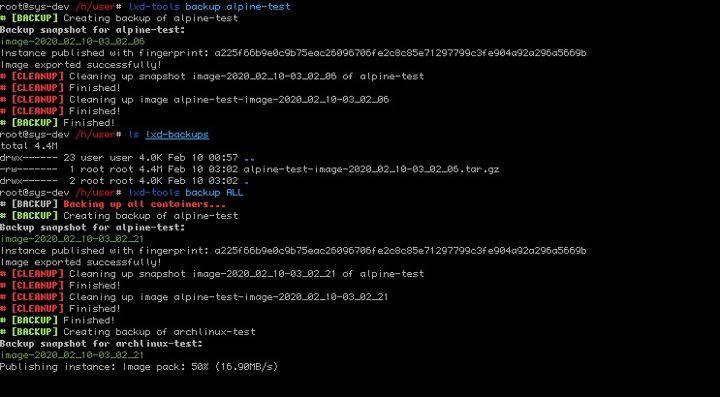
Fetch a random fursona from thisfursonadoesnotexist.com
researcx/xch (incomplete)
Imageboard software.
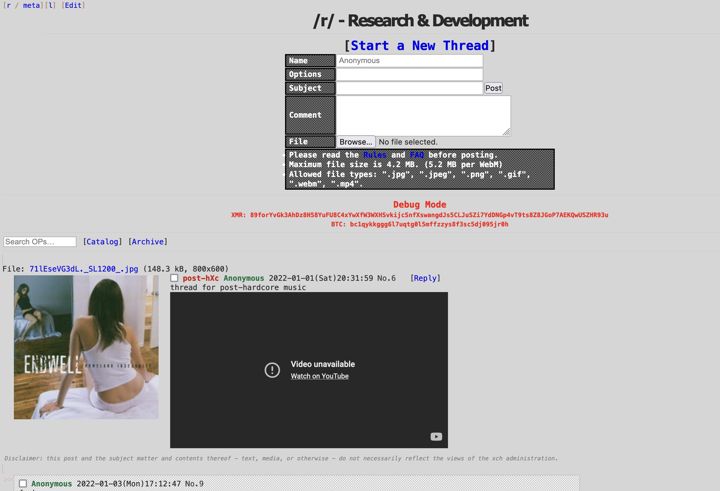
Feature List
"infinity" imageboard script fork with fixes, instructions for modern system installation, basic recent threads functionality and some added missing files.
Directory listing script based on SPKZ's + Garry's Directory Listing.

Features:
- Lists all folders as-is without the need for a database.
- Automatic thumbnail generation for images and videos (150x150, 720x, 1600x)
- Embedded images, animation (.gif) and videos
- Toggle for image grid and gallery view
- RSS feeds for entire site and individual folders
- 18+ notices for folders marked as NSFW
- Ability to add hidden folders
i3-gaps patch for qubes 3.2.
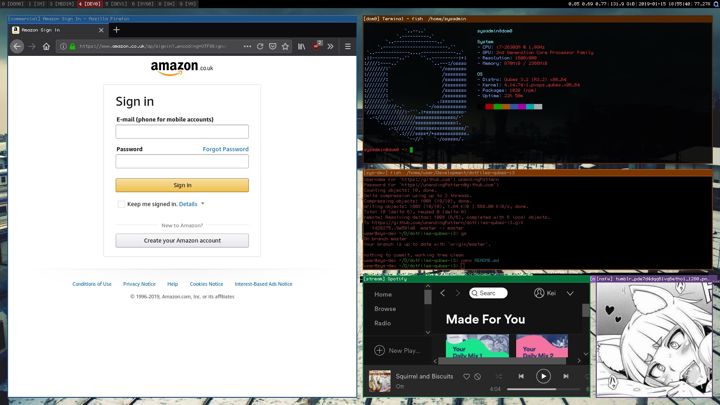
researchdepartment/dotfiles-qubes3.2-i3 (get the full dotfiles for the above setup here)
From SietsevanderMolen/i3-qubes
Fork of the goscraper webpage-scraper which adds timeout, proxy and user-agent support.
From badoux/goscraper.
void-linux-install
Minimal instructions for installing Void Linux on MBR + Legacy BIOS.
bash
loadkeys uk
wpa_passphrase <MYSSID> <key> >> /etc/wpa_supplicant/wpa_supplicant.conf
wpa_supplicant -i <device> -c /etc/wpa_supplicant/wpa_supplicant.conf -B
parted /dev/sdX mklabel msdos
cfdisk /dev/sdX
mkfs.ext2 /dev/sdX1
cryptsetup luksFormat --type luks2 --cipher aes-xts-plain64 --key-size 512 --hash sha256 /dev/sdX2
cryptsetup luksOpen /dev/sdX2 sysroot
pvcreate /dev/mapper/sysroot
vgcreate void /dev/mapper/sysroot
lvcreate --size 2G void --name swap
lvcreate -l +100%FREE void --name root
mkfs.xfs -i sparse=0 /dev/mapper/void-root
mkswap /dev/mapper/void-swap
mount /dev/mapper/void-root /mnt
swapon /dev/mapper/void-swap
mkdir /mnt/boot
mount /dev/sdX1 /mnt/boot
for i in /dev /dev/pts /proc /sys /run; do sudo mount -B $i /mnt$i; done
xbps-install -Sy -R https://mirrors.dotsrc.org/voidlinux/current -r /mnt base-system lvm2 cryptsetup grub nano htop tmux
chroot /mnt
bash
chown root:root /
chmod 755 /
passwd root
useradd -m -s /bin/bash -U -G wheel,users,audio,video,cdrom,input MYUSERNAME
passwd MYUSERNAME
nano /etc/sudoers
nano /etc/rc.conf
echo somehostname > /etc/hostname
echo "LANG=en_US.UTF-8" > /etc/locale.conf
echo "en_US.UTF-8 UTF-8" >> /etc/default/libc-locales
xbps-reconfigure -f glibc-locales
BOOT_UUID=$(blkid -o value -s UUID /dev/sdX1)
CRYPTD_UUID=$(blkid -o value -s UUID /dev/sdX1)
nano /etc/fstab
echo "UUID=${BOOT_UUID} /boot ext2 defaults 0 2"
echo "GRUB_CMDLINE_LINUX_DEFAULT=\"loglevel=4 slub_debug=P page_poison=1 acpi.ec_no_wakeup=1 rd.auto=1 cryptdevice=UUID=${CRYPTD_UUID}:sysroot root=/dev/mapper/void-root resume=/dev/mapper/void-swap\"" >> /etc/default/grub
echo "GRUB_ENABLE_CRYPTODISK=y" >> /etc/default/grub
grub-install /dev/sdX
xbps-reconfigure -f linux4.19
cp /etc/wpa_supplicant/wpa_supplicant.conf /mnt/etc/wpa_supplicant/wpa_supplicant.conf
exit
umount -R /mnt
reboot
cryptsetup luksOpen /dev/sdX2 sysroot
vgchange -a y void
mount /dev/mapper/void-root /mnt
mount /dev/sdX1 /mnt/boot
for i in /dev /dev/pts /proc /sys /run; do sudo mount -B $i /mnt$i; done
chroot /mnt
bash
arch-linux-install
Minimal instructions for installing Arch Linux on GPT or MBR on UEFI or Legacy BIOS.
sudo dd bs=4M if=archlinux-2019.01.01-x86_64.iso of=/dev/sdb status=progress oflag=sync
loadkeys uk
parted /dev/sdX mklabel msdos
cfdisk /dev/sdX
cgdisk /dev/sdX
mkfs.ext2 /dev/sdX1
mkfs.vfat -F32 /dev/sdX1
mkfs.ext2 /dev/sdX2
cryptsetup luksFormat --type luks2 --cipher aes-xts-plain64 --key-size 512 --hash sha256 /dev/sdX3
cryptsetup luksOpen /dev/sdX3 sysroot
pvcreate /dev/mapper/sysroot
vgcreate arch /dev/mapper/sysroot
lvcreate --size 2G arch --name swap
lvcreate -l +100%FREE arch --name root
mkfs.xfs /dev/mapper/arch-root
mkswap /dev/mapper/arch-swap
mount /dev/mapper/arch-root /mnt
swapon /dev/mapper/arch-swap
mkdir /mnt/boot
mount /dev/sdX1 /mnt/boot
mount /dev/sdX2 /mnt/boot
mkdir /mnt/boot/efi
mount /dev/sdX1 /mnt/boot/efi
wifi-menu
pacstrap /mnt base base-devel fish nano vim git efibootmgr grub grub-efi-x86_64 dialog wpa_supplicant lsb-release
genfstab -pU /mnt >> /mnt/etc/fstab
nano /mnt/etc/fstab
arch-chroot /mnt /bin/fish
ln -sf /usr/share/zoneinfo/Europe/Jersey /etc/localtime
hwclock --systohc --utc
echo somehostname > /etc/hostname
nano /etc/locale.gen
echo LANG=en_US.UTF-8 >> /etc/locale.conf
locale-gen
passwd
useradd -m -g users -G wheel -s /bin/fish MYUSERNAME
passwd MYUSERNAME
nano /etc/sudoers
nano /etc/mkinitcpio.conf
grub-install --target=i386-pc /dev/sdX
exit
mkdir /mnt/hostlvm
mount --bind /run/lvm /mnt/hostlvm
arch-chroot /mnt /bin/fish
ln -s /hostlvm /run/lvm
nano /etc/default/grub
grub-mkconfig -o /boot/grub/grub.cfg
grub-install --target=x86_64-efi --efi-directory=/boot/efi --bootloader-id=ArchLinux
nano /etc/default/grub
bootctl --path=/boot/efi install
nano /boot/efi/loader/entries/arch.conf
mkinitcpio -p linux
exit
umount -R /mnt
swapoff -a
reboot
cryptsetup luksOpen /dev/sdX3 sysroot
mount /dev/mapper/arch-root /mnt
mount /dev/sdX1 /mnt/boot
mount /dev/sdX2 /mnt/boot
mount /dev/sdX1 /mnt/boot/efi
arch-chroot /mnt /bin/fish
Oragono IRCd mod providing imageboard features and anonymity to IRC.
Warning: Highly experimental!
Features and ideas of this fork:
- Tripcode and secure tripcode system (set password (/pass) to #tripcode, #tripcode#securetripcode or ##securetripcode to use) (90%)
- Auditorium mode (+u) (inspircd style) (90%)
- Greentext and basic ~markdown-to-irc~ formatting support (20%)
- Channel mode for displaying link titles and description (+U) (99%)
- Channel mode for group highlights per word basis (
+H <string>) (i.e. /mode #channel +H everyone; /msg hey @everyone) (90%) (Add cooldown system (0%))
- Private queries/whitelist mode (+P) which requires both users to be mutual contacts to use private messaging. (10%)
- Automatically generated and randomized join/quit (quake kill/death style?) messages (0%)
- Server statistics (join/quit/kick/ban counter, lines/words spoken) (0%)
- Simple federation (the irc will work over DHT or a similar system to be provided worldwide for anyone to be able to use, anyone should be able to host a server that connects to it with little to no knowledge required) (0%)
- Build in a webrtc voice/video chat server and make (or modify an open source) webclient to support voice and video chatting (0%)
- Web front-end for chat with trip authentication with discord-style themes, avatar support, automatically hosted for every server/client (0%)
- Anonymity changes (reduced whois info, removed whowas info, completely hide or obfuscate ips/hostmasks, make users without tripcode completely anon and unidentifiable) (60%)
From ergochat/ergo
My personal weechat configuration.
Added user count and user list API call to znc-httpadmin.
From prawnsalad/znc-httpadmin
researcx/SynDBB (Cyndi)
An IRC, imageboard, Facepunch and SomethingAwful inspired forum software.
Hybridization of different aspects of classic internet forums, imageboards, and IRC.
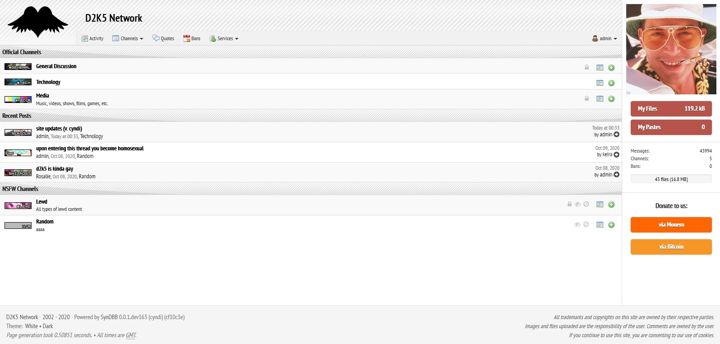
Features:
- File uploader with external upload support.
- Anonymous file uploader.
- Automatic Exif data removal on uploaded images.
- Deleted files securely wiped using "shred".
- File listing with file info and thumbnails.
- Temporary personal image galleries.
- Custom user-created channels.
- List and grid (catalog) view modes for channels.
- List and gallery view modes for threads.
- Rating system for threads, quotes and IRC.
- Site/IRC integration API.
- Avatar history with the ability to re-use avatars without uploading them.
- Custom emoticon submission (admin approval required).
- QDB style quote database for IRC quotes (quotes are admin approved).
- Simple pastebin.
- Improved site and IRC API.
- LDAP Authentication support (+ automatic migration)
- JSON based configuration file.
- Most aspects of the site configurable in config.json.
- Display names (+ display name generator).
- Username generator.
- Summary cards for user profiles.
- Profile and user tags.
- NSFW profile toggle.
- Tall avatar support (original avatar source image is used) for profiles (all members) and posts (donators).
- Various configuration options for custom channels (access control, moderator list, NSFW toggle, anon posting toggle, imageboard toggle, etc)
- Channel and thread info displayed on sidebar.
- User flairs.
- Multi-user/profile support (accounts can be linked together and switched between with ease).
- Mobile layout.
- Theme selector.
- All scripts and styles hosted locally.
- Scripts for importing posts from imageboards and RSS feeds.
More images...
file_download.py (unavailable)
Automated per-channel/server/buffer/query link/file archiver script for weechat (async).
fp-ban (unavailable)
Evercookie based fingerprinting + user ban system. Previously used on the Space Station 13 server.
dnsbl
IRC DNSBL style user/bot blocking in PHP.
<?php
function CheckIfSpambot($emailAddress, $ipAddress, $userName, $debug = false)
{
$spambot = false;
$errorDetected = false;
if ($emailAddress != "")
{
$xml_string = file_get_contents("http://www.stopforumspam.com/api?email=" . urlencode($emailAddress));
$xml = new SimpleXMLElement($xml_string);
if ($xml->appears == "yes")
{
$spambot = true;
}
elseif ($xml->appears == "no")
{
$spambot = false;
}
else
{
$errorDetected = true;
}
}
if ($spambot != true && $ipAddress != "")
{
$xml_string = file_get_contents("http://www.stopforumspam.com/api?ip=" . urlencode($ipAddress));
$xml = new SimpleXMLElement($xml_string);
if ($xml->appears == "yes")
{
$spambot = true;
}
elseif ($xml->appears == "no")
{
$spambot = false;
}
else
{
$errorDetected = true;
}
}
if ($spambot != true && $userName != "")
{
$xml_string = file_get_contents("http://www.stopforumspam.com/api?username=" . urlencode($userName));
$xml = new SimpleXMLElement($xml_string);
if ($xml->appears == "yes")
{
$spambot = true;
}
elseif ($xml->appears == "no")
{
$spambot = false;
}
else
{
$errorDetected = true;
}
}
if ($debug == true)
{
return $errorDetected;
}
else
{
return $spambot;
}
}
function ReverseIPOctets($inputip){
$ipoc = explode(".",$inputip);
return $ipoc[3].".".$ipoc[2].".".$ipoc[1].".".$ipoc[0];
}
function IsTorExitPoint($ip){
if (gethostbyname(ReverseIPOctets($ip).".".$_SERVER['SERVER_PORT'].".".ReverseIPOctets($_SERVER['SERVER_ADDR']).".ip-port.exitlist.torproject.org")=="127.0.0.2") {
return true;
} else {
return false;
}
}
function checkbl($ip){
$blacklisted = 0;
$whitelist = array('');
$blacklist = array('');
$range_blacklist = array('');
$city_blacklist = array('');
$region_blacklist = array('');
$geoip = geoip_record_by_name($ip);
$mask=ip2long("255.255.255.0");
$remote=ip2long($ip);
if (IsTorExitPoint($ip)) {
$blacklisted = 1;
}
if (CheckIfSpambot('', $ip, '')){
$blacklisted = 1;
}
foreach($range_blacklist as $single_range){
if (($remote & $mask)==ip2long($single_range))
{
$blacklisted = 1;
}
}
foreach($city_blacklist as $city){
if ($geoip['city'] == $city)
{
$blacklisted = 1;
}
}
foreach($region_blacklist as $region){
if ($geoip['region'] == $region)
{
$blacklisted = 1;
}
}
if (in_array($ip, $blacklist)) {
$blacklisted = 1;
}
if($blacklisted && !in_array($ip, $whitelist)){
return 1;
}else{
return 0;
}
}
if(isset($_REQUEST['ip'])){
echo checkbl($_REQUEST['ip']);
}else{
echo checkbl($_SERVER['REMOTE_ADDR']);
}
?>
simple_bash_uploader
Bash file/screenshot upload script (scrot compatible)
#!/bin/sh
sleep 0.1
export DISPLAY=:0.0
UPLOAD_SERVICE="My Awesome Server"
RANDOM_FILENAME=$(cat /dev/urandom | tr -dc 'a-zA-Z0-9' | fold -w 32 | head -n 1)
IMAGE_PATH="/home/$USER/Screenshots/$RANDOM_FILENAME.png"
REMOTE_USER="test"
REMOTE_SSH_AUTH="~/.ssh/my_ssh_key"
REMOTE_SERVER="example.org"
REMOTE_PORT="22"
REMOTE_PATH="/var/www/html/files/"
REMOTE_URL="https://example.org/files/"
if [ "$1" == "full" ]; then
MODE=""
elif [ "$1" == "active" ]; then
MODE="-u"
elif [ "$1" == "selection" ]; then
MODE="-s"
else
FILE_PATH=$1
FILE_NAME=$(basename $FILE_PATH)
FILE_EXT=".${FILE_NAME##*.}"
notify-send "$UPLOAD_SERVICE" "Upload of file '$RANDOM_FILENAME$FILE_EXT' started."
scp -i $REMOTE_SSH_AUTH -P $REMOTE_PORT $FILE_PATH $REMOTE_USER@$REMOTE_SERVER:$REMOTE_PATH$RANDOM_FILENAME$FILE_EXT
if [ $? -eq 0 ];
then
echo -n $REMOTE_URL$RANDOM_FILENAME$FILE_EXT|xclip -sel clip
notify-send "$UPLOAD_SERVICE" $REMOTE_URL$RANDOM_FILENAME$FILE_EXT
else
notify-send "$UPLOAD_SERVICE" "Upload failed!"
fi
exit
fi
scrot $MODE -z $IMAGE_PATH || exit
notify-send "$UPLOAD_SERVICE" "Upload of screenshot '$RANDOM_FILENAME.png' started."
scp -i $REMOTE_SSH_AUTH -P $REMOTE_PORT $IMAGE_PATH $REMOTE_USER@$REMOTE_SERVER:$REMOTE_PATH
if [ $? -eq 0 ];
then
echo -n "$REMOTE_URL$RANDOM_FILENAME.png"|xclip -sel clip
notify-send "$UPLOAD_SERVICE" "$REMOTE_URL$RANDOM_FILENAME.png"
else
notify-send "$UPLOAD_SERVICE" "Upload failed!"
fi
Spacetopia Marketplace
Based on my XenForo forum shop system. Adds extra features for BYOND and Spacetopia integration.
Additional features:
- Support for BYOND sprite files
- Allows user submitted content.
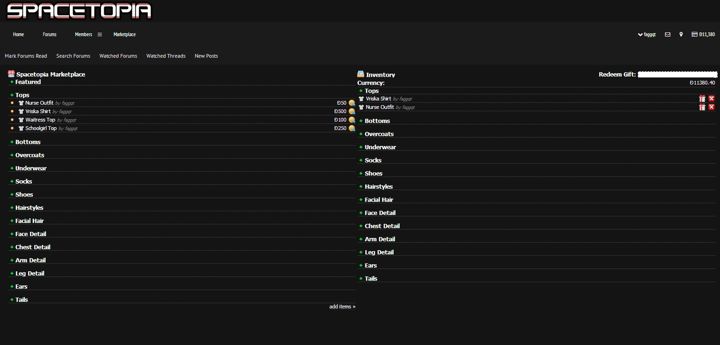
Shop/Market System
A simple shop system, later made modular and given an internal API to make it able to work with any forum or CMS software.

Features:
- Ability to buy items using real money or on-site currency.
- Users can buy on-site currency with real money.
- Users can submit their own items.
- User accounts which serve as banks.
- Automatically calculated item pricing (inflation) based on bank accounts' currency and item ownership.
- Rating and flagging system for items.
- Items have a redeem code for gifting or giveaways.
- An inventory which displays each item you own.
- Items can be either used, activated or downloaded depending on their type.
Smartness Points
Highlights bad grammar and misspellings as red, reduces points for each mistake as a disciplinary action. Based on the Facepunch Studios smartness system from around 2004-2005.

Features:
- Supports a customizable list of words, thus can be used for more than just grammar/spelling mistakes.
- Users will lose a point for each bad word.
- By correcting a message, the user will gain back any points lost.
Imageboard style warn/ban notices
Appends "USER WAS BANNED FOR THIS POST (REASON)" and/or "USER WAS WARNED FOR THIS POST (REASON)" at the bottom of the users' post.

SS13/BYOND API
Features:
- XenForo user profile info fetching system.
- Trophy (achievement) get and set system.
- BYOND ckey comparison using XenForo custom profile fields.
- Fetch clothing and character customization from user profile fields.
- Shop integration.
- bdBank integration.
Space Station 13 Linux Server Toolkit
#!/bin/sh
source ../byond/bin/byondsetup
cd `dirname $0`
isdefined=0
${1+ export isdefined=1}
if [ $isdefined == 0 ] ; then
echo "Space Station 13 Linux Server Toolkit"
echo "by researcx (https://github.com/researcx)"
echo "Parameters: start, stop, update, compile, version"
exit
fi
LONG=`git --git-dir=../space-station-13/.git rev-parse --verify HEAD`
SHORT=`git --git-dir=../space-station-13/.git rev-parse --verify --short HEAD`
VERSION=`git --git-dir=../space-station-13/.git shortlog | grep -E '^[ ]+\w+' | wc -l`
if [ $1 == "start" ]; then
DreamDaemon 'goonstation.dmb' -port 5200 -log serverlog.txt -invisible -safe &
elif [ $1 == "stop" ]; then
pkill DreamDaemon
elif [ $1 == "update" ]; then
echo 'Downloading latest content from .git'
git clone https://invalid.url.invalid/repo/space-station-13 ../space-station-13/
echo 'Checking for updates'
sh -c 'cd ../space-station-13/ && /usr/bin/git pull origin master'
LONG=`git --git-dir=../space-station-13/.git rev-parse --verify HEAD`
SHORT=`git --git-dir=../space-station-13/.git rev-parse --verify --short HEAD`
VERSION=`git --git-dir=../space-station-13/.git shortlog | grep -E '^[ ]+\w+' | wc -l`
curl "http://invalid.url.invalid/status/status.php?type=update&ver=$VERSION&rev=$LONG"
echo ''
elif [ $1 == "compile" ]; then
echo "Compiling Space Station 13 (Revision: $VERSION)"
TIME="$(sh -c "time DreamMaker ../space-station-13/goonstation.dme &> build.txt" 2>&1 | grep real)"
echo $TIME
LONG=`git --git-dir=../space-station-13/.git rev-parse --verify HEAD`
SHORT=`git --git-dir=../space-station-13/.git rev-parse --verify --short HEAD`
VERSION=`git --git-dir=../space-station-13/.git shortlog | grep -E '^[ ]+\w+' | wc -l`
BUILD="$(tail -1 build.txt)"
cp build.txt /usr/share/nginx/html/
curl "http://invalid.url.invalid/status/status.php?type=build&data=$BUILD&ver=$VERSION&time=$TIME&log=http://invalid.url.invalid/build.txt"
elif [ $1 == "version" ]; then
echo "Version Hash: $LONG ($SHORT)"
echo "Revision: $VERSION"
echo "Changes in this version: https://invalid.url.invalid/repo/space-station-13/commits/$LONG"
else
echo "exiting...";
fi
GitLab • GitHub
git-update
Git repository auto-updater
#!/bin/sh
REPO="https://github.com/<user>/<repo>"
PATH="/path/to/repository"
LATEST=`/usr/bin/git ls-remote $REPO refs/heads/master | /usr/bin/cut -f 1`
CURRENT=`/usr/bin/git -C $PATH rev-parse HEAD`
echo "Current Revision: $CURRENT"
echo "Latest Revision: $LATEST"
if [ "$LATEST" == "$CURRENT" ]; then
echo 'No updates found!'
exit
fi
/usr/bin/git -C $PATH pull
researcx/opensim-mod (currently unavailable)
OpenSimulator mods for XenForo bdBank currency and user integration.

More images...
scan_pics
Mass incremental+prefix+suffix photo scanner for direct URLs.
<?php
function zerofill($mStretch, $iLength = 2)
{
$sPrintfString = '%0' . (int)$iLength . 's';
return sprintf($sPrintfString, $mStretch);
}
if(isset($_GET['start'])){
$start = $_GET['start'];
}else{
$start = 0;
}
if(isset($_GET['end'])){
if($_GET['end'] <= 9999){
$end = $_GET['end'];
}else{
$end = 9999;
}
}else{
$end = 9999;
}
if(isset($_GET['url'])){
$url = $_GET['url'];
}else{
die('No parameters specified.');
}
if(isset($_GET['prefix'])){
$prefix = $_GET['prefix'];
}else{
$prefix = null;
}
if(isset($_GET['suffix'])){
$suffix = $_GET['suffix'];
}else{
$suffix = '.jpg';
}
echo '<title>Scanning images from '.$prefix.$start.$suffix.' to '.$prefix.$end.$suffix.'.</title>';
for($i=$start;$i<$end + 1;$i++){
echo '<img src="'.$url.$prefix.zerofill($i,strlen($end)).$suffix.'" width="100" height="100" />';
}
?>
Various Garry's Mod roleplay scripts + hud design.
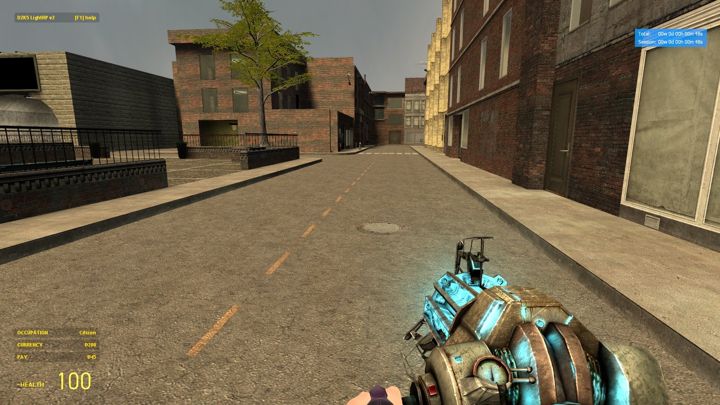
Hit the giant enemy crab in its weak spot for massive damage.
Source modding
- City 47
- Texturing (custom map textures)
- Model editing (custom player-models)
Markov forum bot
Using a combined pyborg IRC database, takes the replies from a forum thread, adding them to its database and formulating a reply to the thread. Can also reply to individual posts. Triggered automatically at random, but also has a chance to reply when replied to or mentioned.
SMF forum mods:
- Neopets-style RP item shop
- Smartness
- Ban list, improved ban system
- Upload site with file listing, thumbnails, search, user to user file sharing/transfers
Instant-messaging system with an IRC backend. (unavailable)
ActiveWorlds City Builds
- Rockford
- Parameira
- D2City
Contact Me:
Support Me:
Image Galleries:
> directory listing - /Technology/

view more...
> directory listing - /Imagedump/

view more...
> directory listing - /Development/

view more...
> directory listing - /Cooking/

view more...
> directory listing - /Photos/
> directory listing - /Music/
> directory listing - /Documents/
> directory listing - /Food/
> directory listing - /Games/

"Halfway through reading a Hacker News thread I kick my boot into the computer. Even when it's an original thread I can't stand it. It feels good to smash the computer though. I feel like I'm participating in the discussion."




























